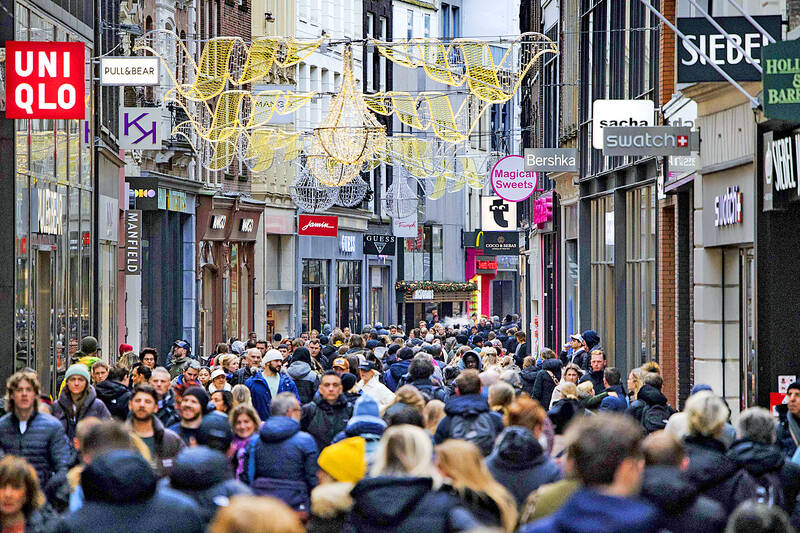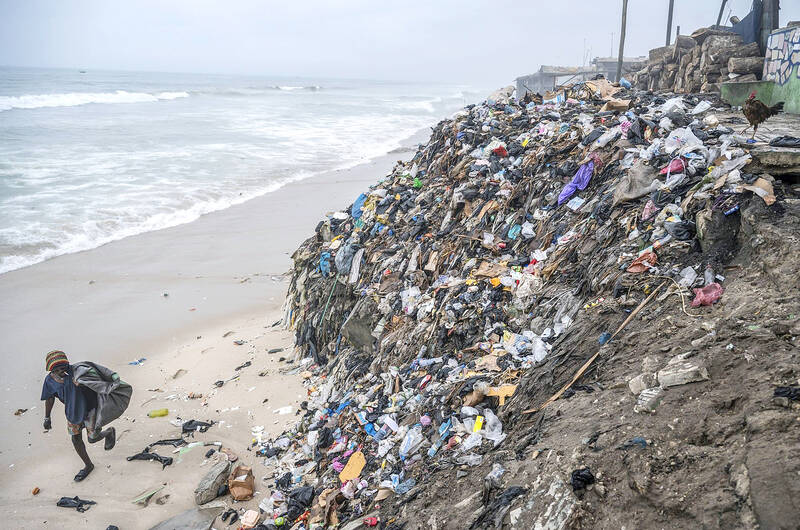Ikram Cakir hands over a multicolored blue and white blouse and selects a similar item, this time in hot pink. Welcome to Amsterdam’s “fashion library.”
Billed as one of the world’s only physical centers for renting used and new clothing, the “big shared wardrobe” in the Dutch capital is a response to clothes waste and fashion industry pollution.
Hundreds of brightly colored pants, coats and overalls are sorted by brand or style, each with a tag indicating a sale price or how much it costs to rent the item per day.

Photo: EPA-EFE
The daily rental price varies from about 0.50 euros (US$0.55) to a couple of euros, depending on the customer’s loyalty — how often they rent clothes and how many are borrowed.
For Cakir, a 37-year-old campaign manager at a non-governmental organization, the concept is “just really good.”
“So many clothes are bought and then never used,” she said.

Photo: Bloomberg
“This is an excellent way to wear new clothes without depleting the planet,” she added.
Globally, the equivalent of a truckload of clothes is burnt or buried in landfills every second, according to the Ellen MacArthur Foundation, a charity focused on eliminating waste and pollution.
The textile industry is also a major polluter, causing 2 to 8 percent of global carbon emissions, the UN said in 2022.
In the era of fast fashion, the average person buys 60 percent more clothing than 15 years ago, while each item is kept for only half as long, the UN says.
Fashion is responsible for one-quarter of the pollution of the world’s waters and one-third of microplastic discharges into the oceans — toxic substances for fish and humans.
All this prompted Elisa Jansen to open “LENA, the fashion library” in a trendy area in central Amsterdam, with her two sisters and a friend.
“Why did we open in 2014? Because the fashion industry is one of the most polluting industries in the world,” she said.
The library also has an online section, plus drop-off and collection points in other Dutch cities.
“Always new clothes. Good for the planet. Experiment with your style. Try before you buy,” reads a poster hanging above LENA’s counter and washing machines, summing up its philosophy.
Jansen’s career began in vintage shops so she said she has “always worked in recycling clothes.”
However, the vintage business did not allow her to acquire new items and she found it too homogenous a style.
“That’s when I got the idea of sharing clothes in a massive shared wardrobe,” she said.
Customers sign up for a 10-euro fee, allowing them to borrow or buy clothes from the collection.
The store has more than 6,000 members, but not everyone is a regular borrower, Jansen said.
Her top priority is the quality of her garments, always preferring longer-lasting brands.
“You won’t find any fast fashion here,” she said, referring to a trend where garments are bought cheaply then discarded after only a few wears.
LENA was “really one of the first of its kind” when it opened nine years ago, she said.
Similar initiatives have been launched in places such as Australia, Canada, France, Scandinavia, Switzerland and the UK, although Jansen said that the Scandinavian outlets appeared to have closed since.
It took some time to find a profitable business model, she said.
Her location in a trendy area mostly attracts women aged 25 to 45 “who want to make sustainable choices, but who also want pretty clothes.”
India Donisi, a 35-year-old wine blogger, is the target audience.
“It’s really very convenient,” she said as she tried on what she called an “extravagant” fuchsia pink blazer.
Donisi regularly rents clothes from the library to wear for media events, but she lives around the corner and said she would not cross town to borrow an outfit.
Jansen said she hopes her initiative will inspire others.
“I really believe this is the future. Our consumption cannot continue as it is,” she said. “I hope other clothing brands will even do it themselves ... so you always have the option to borrow if you don’t want to buy.”

United Microelectronics Corp (UMC, 聯電) expects its addressable market to grow by a low single-digit percentage this year, lower than the overall foundry industry’s 15 percent expansion and the global semiconductor industry’s 10 percent growth, the contract chipmaker said yesterday after reporting the worst profit in four-and-a-half years in the fourth quarter of last year. Growth would be fueled by demand for artificial intelligence (AI) servers, a moderate recovery in consumer electronics and an increase in semiconductor content, UMC said. “UMC’s goal is to outgrow our addressable market while maintaining our structural profitability,” UMC copresident Jason Wang (王石) told an online earnings

Gudeng Precision Industrial Co (家登精密), the sole extreme ultraviolet (EUV) pod supplier to Taiwan Semiconductor Manufacturing Co (TSMC, 台積電), is aiming to expand revenue to NT$10 billion (US$304.8 million) this year, as it expects the artificial intelligence (AI) boom to drive demand for wafer delivery pods and pods used in advanced packaging technology. That suggests the firm’s revenue could grow as much as 53 percent this year, after it posted a 28.91 percent increase to NT$6.55 billion last year, exceeding its 20 percent growth target. “We usually set an aggressive target internally to drive further growth. This year, our target is to

The TAIEX ended the Year of the Dragon yesterday up about 30 percent, led by contract chipmaker Taiwan Semiconductor Manufacturing Co (TSMC, 台積電). The benchmark index closed up 225.40 points, or 0.97 percent, at 23,525.41 on the last trading session of the Year of the Dragon before the Lunar New Year holiday ushers in the Year of the Snake. During the Year of the Dragon, the TAIEX rose 5,429.34 points, the highest ever, while the 30 percent increase in the year was the second-highest behind only a 30.84 percent gain in the Year of the Rat from Jan. 25, 2020, to Feb.

Cryptocurrencies gave a lukewarm reception to US President Donald Trump’s first policy moves on digital assets, notching small gains after he commissioned a report on regulation and a crypto reserve. Bitcoin has been broadly steady since Trump took office on Monday and was trading at about US$105,000 yesterday as some of the euphoria around a hoped-for revolution in cryptocurrency regulation ebbed. Smaller cryptocurrency ether has likewise had a fairly steady week, although was up 5 percent in the Asia day to US$3,420. Bitcoin had been one of the most spectacular “Trump trades” in financial markets, gaining 50 percent to break above US$100,000 and